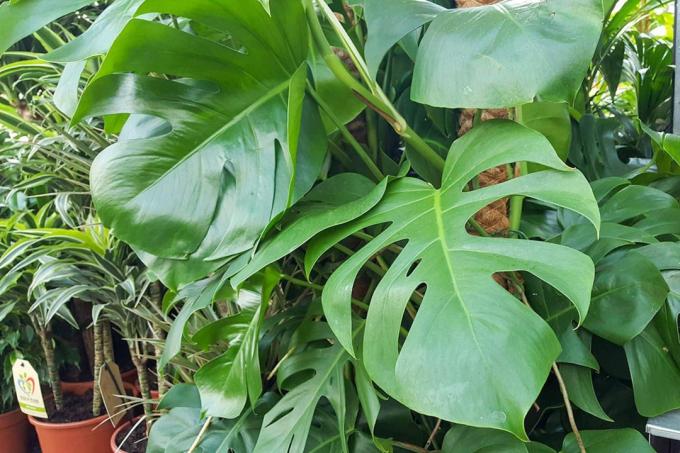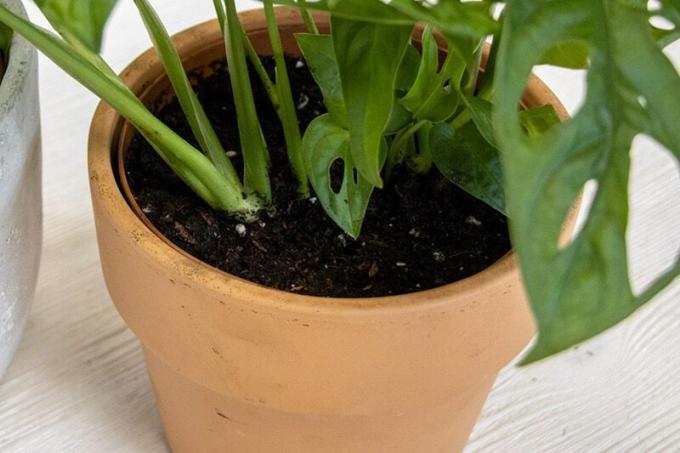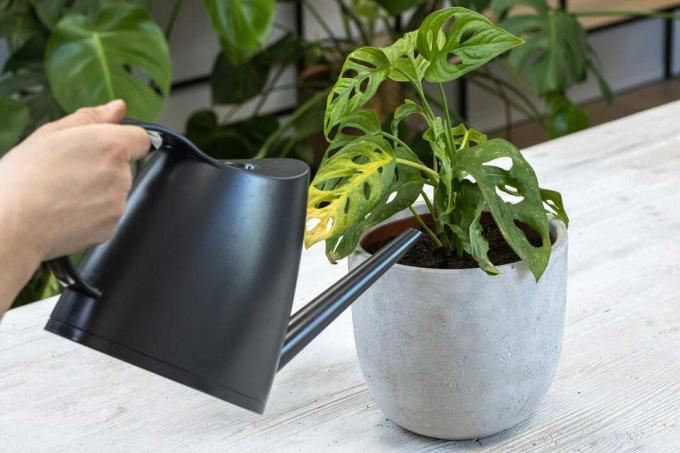
The Monstera is a real trend plant. What is special about it are the imposing, perforated and, depending on the variety, variegated leaves. In order to train them, the water supply in particular must be appropriate. You can find out how to water your Monstera properly here.
In a nutshell
- Watering is one of the most important care measures
- especially timing, amount and type of watering
- severe damage due to incorrect watering behavior
- "Water Plant" replaces regular watering
Table of contents
- timing and frequency
- Correct amount of water
- What do you prefer to water with?
- Casting instructions
- Irrigation as an aquatic plant
- frequently asked Questions
timing and frequency
In order to supply this plant with water as needed, one should not ignore its origin, because in its natural habitat it thrives in a warm, humid climate. When and how often the plants, also known as windowsills, have to be watered depends on several factors.

- Timing dependent on soil moisture
- frequency of the size of the plant
- to the Location or. the light supply
- the season and ambient temperature
- Water more often in summer than in winter
- generally don't water too much, do a finger test
- Spring and summer about once or twice a week
- in winter once every two weeks is sufficient
Correct amount of water
The water requirement of the Monstera is not very high, although it tolerates drought much better than too much moisture. Nevertheless, the substrate should never dry out completely or be dry for a long time, as this means stress for the plant.

Spring/Summer
- Keep soil slightly moist
- risk of root rot if too wet
- Aeration of the soil is disturbed
- often goes with me mold growth along
Autumn winter
- the right amount of water is crucial, especially in winter
- Monstera grows more slowly, water needs less
- much less light and cooler temperatures
- watering significantly less in winter
What do you prefer to water with?
The window leaf belongs to few lime-tolerant houseplants. Nevertheless, the irrigation water should not be too calcareous. To reduce the lime content a little, it is best to let tap water stand for several days so that the lime can settle. Ideally, soft water is used, i.e. rainwater. Distilled water should also be suitable for watering a Monstera. Irrespective of the type of irrigation water, it should never be too cold, but room temperature or warm. be adapted to the substrate temperature.
Casting instructions

To determine if the Monstera needs to be watered again, you should first test the soil moisture. You can do this with a finger test or a small wooden stick that you stick into the ground.
- Substrate is still moist when dark soil sticks
- little or no soil sticks to it, water again
- Allow the substrate to dry to a depth of 2-3 cm
- water thoroughly until water collects in the coaster
- remove excess water after about ten minutes
- allow the substrate to dry out almost completely in winter
- then only water moderately

Tip: In addition to soil moisture, the window leaf needs high humidity. This can be guaranteed by regularly spraying the leaves with lukewarm water about every 2-3 days.
Irrigation as an aquatic plant
In its natural locations, the Monstera does not need any soil at all, so why not cultivate it as a houseplant in water. In addition to the conventional hydroponics so-called "water plants" are very trendy. The Monstera stands in correspondingly large and stable glass vessels exclusively in water, regular watering is not necessary. The visual effect should not be underestimated either. But how do you go about it?
- Glass jar must provide adequate space for roots
- fill with soft or mineral water
- Tap water only if low in lime
- Use Monstera carefully
- Change water after about 7-10 days
- at the latest when it starts to get cloudy

Tip:As a rule, it is easily possible to convert a Monstera previously kept in soil to pure water management. Mold growth on the substrate and annoying fungus gnats are history.
frequently asked Questions
For example, brown, rolled up or hanging leaves can be an indication that the plant is too dry. In contrast, brown leaf edges and/or yellowing leaves can indicate too much moisture. However, yellow leaves can also be an indication of nutrient deficiencies.
In the event of a longer absence, for example due to vacation, hospitalization or the like, you can use the Monstera water by placing a container of water next to the planter and the aerial roots hangs in. In this way, the plant can supply itself with water for a certain period of time. If you have an aquarium, you can also hang the aerial roots in there. In this way, the Monstera is not only supplied with water, but also with nutrients.
The older this plant gets, the more and longer aerial roots it forms. Healthy aerial roots should not be cut off as this could damage the plant. The situation is different with dead or dried-up aerial roots, in which there is obviously no longer any life, which can be cut off without any problems. You can also stick aerial roots into the substrate or lead in.



